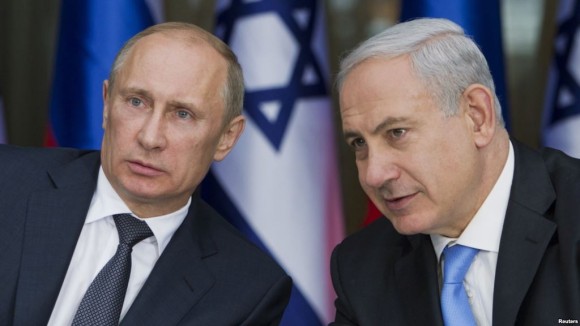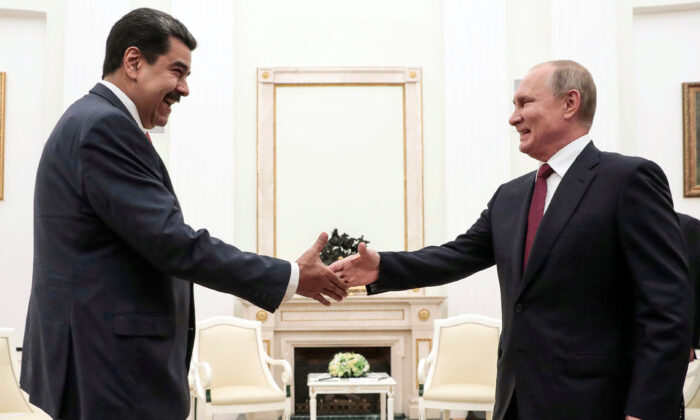By: Cliff Kincaid
Accuracy in Media

As Israeli Prime Minister Benjamin Netanyahu visits Washington and speaks to Congress, bypassing the Obama administration, the stakes could not be higher. But President Obama is not the only, and certainly not the most significant, opponent of Israel. The important new book, “The USA and The New World Order,” features a debate in which one of Russian President Vladimir Putin’s key advisers, Alexander Dugin, criticizes Israel’s “imperialist” role in the Middle East and America’s role in the world as a whole.
A careful reading of this important debate, which occurred in 2011 and has recently been published in book form, demonstrates that it is Russia which is the main threat to Israel and the United States.
Dugin’s debate opponent, the anti-communist Brazilian writer and philosopher Olavo de Carvalho, sees Dugin as the brains behind Putin’s geopolitical strategy that embraces “genocidal violence.” He notes that Dugin has “advocated the systematic killing of Ukrainians—a people who, according to him, do not belong to the human species.”
As for Israel, the debate transcript shows that Dugin regards the Jewish state as “a modern capitalist and Atlantist entity and an ally of American imperialism.” This is a rather straightforward view of how the Moscow regime views Israel today, and why it backs the government of Iran with weapons, nuclear technology, and diplomatic support.
The term “Atlantist” or “Atlanticist” is meant to refer to trans-Atlantic cooperation between Europe, the United States and Canada in defense and other areas.
Iran is a key part of the anti-American alliance. Dugin has explained in the article, “Eurasianism, Iran, and Russia’s Foreign Policy,” that a “strategic alliance” exists between Iran and Russia, and Russia “will not cease its efforts to reduce sanctions against Iran” over its support for terrorism and pursuit of nuclear weapons.
In the debate with de Carvalho, Dugin proclaims, “I have nothing against Israel,” then quickly added, “but its cruelty in repressing the Palestinians is evident.”
To which de Carvalho counters, “The rockets that the Palestinians fire practically every day at non-military areas of Israel are never reported by the international big media, whereas any raid by Israel against Palestinian military installations always provokes the greatest outcry all over the world.”
He tells Dugin, “I know the facts, my friend. I know the dose of violence on both sides. I know, for instance, that the Israelis never use human shields, while the Palestinians almost always do it. I know that, in Israel, Muslims have civil rights and are protected by the police, while, in countries under Islamic rule, non-Muslims are treated as dogs and often stoned to death.”
This exchange is only part of a debate that puts Israel in the context of a global conflict that Dugin sees as “The West against the rest.” The world is going through a “global transition,” away from dominance by the U.S. and its allies, he asserts.
De Carvalho commented that Dugin, himself the son of a KGB officer, is “the political mentor of a man [Vladimir Putin] who is the very incarnation of the KGB.” He said that Dugin has emerged as “the creator and guide of one of the widest and most ambitious geopolitical plans of all time—a plan adopted and followed as closely as possible by a nation which has the largest army in the world, the most efficient and daring secret service and a network of alliances that stretches itself through four continents.”
De Carvalho describes Eurasianism as “a synthesis of the defunct USSR and the Tzarist Empire” that includes philosophical elements of Marxism-Leninism, Russian Messianism, Nazism, and esotericism. The last element is a reference to certain occult influences in Russia.
“In order to fulfill his plans,” de Carvalho explains, “he counts on Vladimir Putin’s strong arm, the armies of Russia and China and every terrorist organization of the Middle East, not to mention practically every leftist, fascist and neo-Nazi movements which today place themselves under the banner of his ‘Eurasian’ project.”
He says the historical roles played by Russia and China in sponsoring and arming terrorist groups help explain why global Islam has targeted the United States and Israel. “Some theoreticians of the Caliphate allege that socialism, once triumphant in the world, will need a soul, and Islam will provide it with one,” he notes.
In this global war for domination, however, he also identifies a “globalist elite,” including in the U.S. Government and society, which wants to destroy traditional Christianity and share in “the spoils” from the decaying West.
What we are witnessing, he writes, is an “alliance of Russia with China and the Islamic countries, as well as with part of Western Europe,” that has come together in a “total war against the United States and Israel,” which is to be followed by “the establishment of a worldwide dictatorship.” It is the replacement of an “Atlanticist Order” by the “Eurasian Order.”
For those who doubt such global schemes could come to pass, de Carvalho says that Dugin “is not a dreamer, a macabre poet creating imaginary hecatombs in a dark dungeon infested with rats.” Rather, he is “the mentor of the Putin government and the brains behind Russian foreign policy,” whose ideas “have long ceased to be mere speculations.”
De Carvalho identifies among these “material incarnations” of the Dugin vision the Shanghai Cooperation Organization (SCO), a group founded by Russia, China, Kyrgyzstan, Tajikistan and Uzbekistan, which “intends to be the center of a restructuring of military power in the world.” Iran has been an observer state at the SCO since 2005. He also cites the Paris-Berlin-Moscow axis, a geopolitical term for countries which are seen as developing a mechanism to replace NATO, the one-time anti-communist alliance.
Another such international organization is the BRICS alliance of nations, incorporating Brazil, Russia, India, China, and South Africa. Iran is also discussing joining BRICS.
On January 20, Iran and Russia signed an agreement expanding their military ties. Russian defense minister Sergei Shoigu said Moscow wants to develop a “long-term and multifaceted” military relationship with Iran. Just a few days ago Russia offered to sell the Antey-2500 anti- aircraft and ballistic missile system to Iran. “The United States and Israel lobbied Russia to block the missile sale, saying it could be used to shield Iran’s nuclear facilities from possible future air strikes,” Reuters reported.
For its part, the government of Israeli Prime Minister Netanyahu has been warning about Iran while simultaneously conducting cordial relations with Russia and refusing to condemn Putin for invading Ukraine. Israeli Foreign Minister Avigdor Lieberman says Israel will maintain “neutrality” in the Russian-Ukrainian conflict. “Maintenance of good relations with Russia is a priority moment for Israel and its principal stance,” Lieberman said.
It has been estimated that more than 6,000 people have died in eastern Ukraine since Russia’s invasion of the country. The Obama administration has refused to supply Ukraine with weapons for its own self-defense.

















